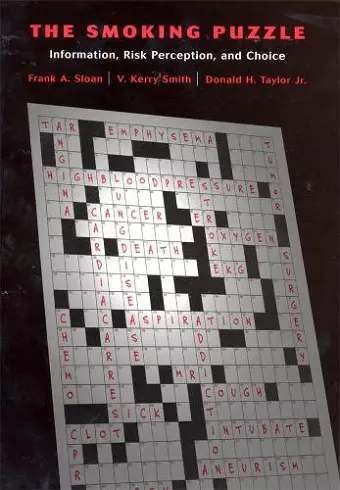The Smoking Puzzle
Information, Risk Perception, and Choice
Frank A Sloan author V Kerry Smith author Donald H Taylor author
Format:Hardback
Publisher:Harvard University Press
Published:15th Jul '03
Currently unavailable, and unfortunately no date known when it will be back

This book makes an important contribution to tobacco policy by suggesting a new direction in information policy. In doing so, it skillfully navigates between those who claim that smokers rationally understand what they are doing--and in fact may overestimate the health risks they run--and those who claim excise taxes should be increased to keep smokers from harming themselves. -- Joseph Newhouse, Harvard University By focusing attention on older smokers, The Smoking Puzzle provides a new and very valuable set of lessons for tobacco policy. Sloan, Smith, and Taylor document that older smokers do quit in appreciable numbers--but most quit too late, after a lifetime of cigarette smoking has already begun to exact its price. In an argument grounded in economic and psychological theory, and buttressed by copious qualitative and quantitative empirical analysis, the authors show that there is ample room for improvement. Properly designed public policy-well described in the book-can lead to significant increases in quitting among still-healthy older smokers. This book is an essential addition to the literature on smoking. -- Sherry Glied, Columbia University This is an excellent book. It covers important new material and covers it well. It provides both a broad overview of the economics of smoking and some new analyses of how risk perceptions matter for smoking decisions. The findings and the discussion are important and are likely to have a major impact on the field. -- Jonathan Gruber, Massachusetts Institute of Technology
The authors find that smokers tend to be overly optimistic about longevity and future health if they quit later in life. Smokers over 50 revise their perceptions only after a major health shock. If smokers are informed of long-term consequences and are told that quitting can come too late, they are able to evaluate the risks more accurately.
How do smokers evaluate evidence that smoking harms health? Some evidence suggests that smokers overestimate health risks from smoking. This book challenges this conclusion. The authors find that smokers tend to be overly optimistic about their longevity and future health if they quit later in life.
Older adults' decisions to quit smoking require personal experience with the serious health impacts associated with smoking. Smokers over fifty revise their risk perceptions only after experiencing a major health shock--such as a heart attack. But less serious symptoms, such as shortness of breath, do not cause changes in perceptions. Waiting for such a jolt to occur is imprudent.
The authors show that well-crafted messages about how smoking affects quality of life can greatly affect current perceptions of smoking risks. If smokers are informed of long-term consequences of a disease, and if they are told that quitting can indeed come too late, they are able to evaluate the risks of smoking more accurately, and act accordingly.
This book makes an important contribution to tobacco policy by suggesting a new direction in information policy. In doing so, it skillfully navigates between those who claim that smokers rationally understand what they are doing—and in fact may overestimate the health risks they run—and those who claim excise taxes should be increased to keep smokers from harming themselves. -- Joseph Newhouse, Harvard University
By focusing attention on older smokers, The Smoking Puzzle provides a new and very valuable set of lessons for tobacco policy. Sloan, Smith, and Taylor document that older smokers do quit in appreciable numbers—but most quit too late, after a lifetime of cigarette smoking has already begun to exact its price. In an argument grounded in economic and psychological theory, and buttressed by copious qualitative and quantitative empirical analysis, the authors show that there is ample room for improvement. Properly designed public policy—well described in the book—can lead to significant increases in quitting among still-healthy older smokers. This book is an essential addition to the literature on smoking. -- Sherry Glied, Columbia University
This is an excellent book. It covers important new material and covers it well. It provides both a broad overview of the economics of smoking and some new analyses of how risk perceptions matter for smoking decisions. The findings and the discussion are important and are likely to have a major impact on the field. -- Jonathan Gruber, Massachusetts Institute of Technology
ISBN: 9780674010390
Dimensions: unknown
Weight: 549g
288 pages